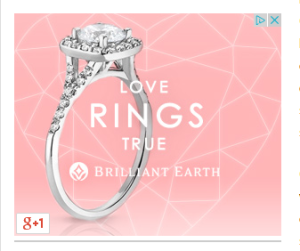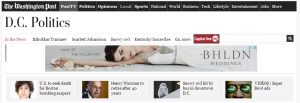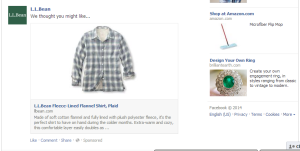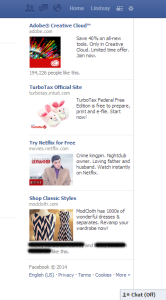When I pull up my browser every morning, I know what I’m going to see before I ever type in a URL or click on a link: engagement rings. On Facebook, on news sites, on blogs, I see them without fail.
 They are the number one thing advertised to me since one of my best friends started planning her wedding a few months ago. I’ve been reading wedding blogs to send her ideas, and gone down the Pinterest rabbit hole of wedding-themed pages a few times—and you better believe my browser knows it. In fact, because I haven’t turned off my browser’s ability to track my web activity, and because the same browser is also logged into Facebook and Google, every website I visit knows a lot about me—and they have all come to the conclusion that I want to be engaged.
They are the number one thing advertised to me since one of my best friends started planning her wedding a few months ago. I’ve been reading wedding blogs to send her ideas, and gone down the Pinterest rabbit hole of wedding-themed pages a few times—and you better believe my browser knows it. In fact, because I haven’t turned off my browser’s ability to track my web activity, and because the same browser is also logged into Facebook and Google, every website I visit knows a lot about me—and they have all come to the conclusion that I want to be engaged.
When I log onto a page that uses Google AdSense to fill its advertising space, there’s an ad auction that happens in the milliseconds it takes for my page to load (Google Ads, 2014; Fresh Air, 2014). The decision is data heavy. It’s based on what site I’m visiting, the relevance of the ad to the site content and my tracked preferences, the quality of the ad itself, and what Google ads knows about me (Google, 2014).
And boy do they know a lot. Between the average 64 pieces of tracking information that top websites use to monitor my online habits (Angwin, 2010) and about 200 data brokers that are continuously compiling and selling that info, I’m no stranger (Fresh Air, 2014). Google tells its advertisers I’m a 28-year-old woman in a long-term, but unmarried, relationship who has recently been browsing wedding websites, and BAM—it’s rings and gowns for me.
 Advertisers bid more—but save overall—to have their ads displayed to the target consumers, and Google contends that I win, too, by only seeing ads of interest and being spared from ads for products I’ll never buy.
Advertisers bid more—but save overall—to have their ads displayed to the target consumers, and Google contends that I win, too, by only seeing ads of interest and being spared from ads for products I’ll never buy.
I’ve been hyper aware of this practice since we read about it in Brand Media Strategy, and it’s raised a few questions for me that I’m still debating:
- Does it really make advertising a better experience for the consumer? As much as I hate to admit it, yes. If I have to see ads on every website, why not for things I actually like? Here’s Facebook showing me a shirt I had just viewed online, a mop I actually purchased, and yes, more rings. Sure, they’re still ads, but they somehow feel less painful. Plus, who cares if Google knows I like practical winter clothing and vintage rings?

- Is it really as creepy as it seems? The answer is probably also yes. Since I started monitoring my ads last month, I realized I didn’t see a single ad that I couldn’t trace back to some recent online activity. I’m not sure that I even see ads anymore that aren’t a direct result of my browsing history. Then I heard an interview on NPR’s Fresh Air with an author who said that even though tracking data is anonymous, it’s now so specific that it can easily be traced back to an individual (Fresh Air, 2014). That’s far more unsettling after a search on, say, migraines brings you ads for medications.
- Do they really work for advertisers? These ad auctions allow for incredible targeting and also invite small businesses with low budgets to play in the ad big leagues. But the data side isn’t perfect yet. I frequently see ads for products I’ve viewed but also purchased. All of January I saw ads for the boots I bought my boyfriend for Christmas. The following series of ads was especially ineffective: I already have the Creative Cloud now, I’m a TurboTax user and a Netflix subscriber (but have been searching for it a lot for this class!), and I already purchased that exact dress from ModCloth last October. That’s a lot of wasted ad space.

As consumers become more aware of data tracking, and just how much data brokers know about them, I wouldn’t be surprised if new regulations follow. It’s just as likely, though, that we will continue to accept and grow more comfortable with advertisers knowing more about us, especially if it means we see better, more relevant ads.
The advertising scene from the 2002 movie Minority Report used to seem so creepy and futuristic; now it seems like something Google would be beta testing:
I’m curious to see where others come down on the issue. Have you changed your browser’s tracking options? Do you take special steps to stop your data from getting out there? Do you feel like you respond more to online ads when they better meet your interests?
References
Angwin, J. (2010, July 30). The Web’s new gold mine: Your secrets. The Wall Street Journal. Retrieved from http://online.wsj.com/news/articles/SB10001424052748703940904575395073512989404
Fresh Air. (2014, February 24). If you think you’re anonymous online, think again. NPR All Tech Considered. Retrieved from http://www.npr.org/blogs/alltechconsidered/2014/02/24/282061990/if-you-think-youre-anonymous-online-think-again
Google Ads. (2014). AdSense: How it works. Retrieved from http://www.google.com/adsense/start/how-it-works.html
Google. (2014). Help: About the ad auction. Retrieved from https://support.google.com/adsense/answer/160525?hl=en&ref_topic=1628432

4 Responses to Creepy or Convenient? Targeted Advertising and the Do-Not-Track Decision